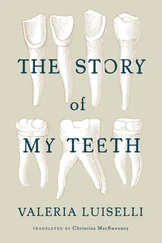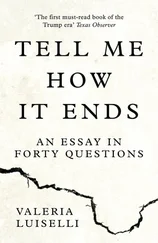Maybe organizing the bookshelves is more effort than it’s worth. True, books look attractive on the shelves and make a space feel inhabited, but when they wake from their vertical slumber, they have lives of their own. Some books even give life to others — like the ones Silvina Ocampo writes about, which, when left to their own devices, begin to fornicate and reproduce.
That book on the bed is a generous and undemanding lover; that other one, on the bedside table, an infallible oracle I consult from time to time, or a talisman against midnight crises; the one on the couch, a pillow for long, dreamless naps. Some books get forgotten for months. They’re left in the bathroom or on top of the fridge in the kitchen for a while and are replaced by others when our indifference eventually wears them away. The few we really do read are places we always return to.
Storage space
Between pages forty-two and forty-three of my edition of Daniel Pennac’s Comme un Roman , a strip of Pepto-Bismol tablets past their expiration date; in John Dos Passos’s Manhattan Transfer , a terse postcard from New Delhi; on the last page of Luces de Bohemia by Ramón del Valle-Inclán, an address and telephone number; in Julio Cortázar’s Rayuela , chapter sixty-eight has been torn out.
Rereading begins in the comments written in the margins, the underlined phrases and scribbled footnotes; but especially in the objects left behind between the pages.
Real estate
After rooting about in one of the boxes, I finally find Écrire in a pile, between Natalia Ginzburg’s Lessico famigliare and Robert Walser’s The Walk . It’s been many years since I read Marguerite Duras. I’m afraid to reread her in case, this time, she bores me or seems affected. Or worse, in case I remember the person I was when I first read her, and dislike myself in her.
I open the book but don’t read anything. Instead, I find between the pages an Indian railway ticket from my teenage years:
Return Ticket. Train No. 6346. Trivandrum Central to Victoria Central Station. One six zero Rupees only, no refunds please. Happy Journey.
Going back to a book is like returning to the cities we believe to be our own, but which, in reality, we’ve forgotten and been forgotten by. In a city — in a book — we vainly revisit passages, looking for nostalgias that no longer belong to us. Impossible to return to a place and find it as you left it — impossible to discover in a book exactly what you first read between its lines. We find, at best, fragments of objects among the debris, incomprehensible marginal notes that we have to decipher to make our own again.
Furnished apartments
“One does not find solitude, one makes it,” writes Duras. Flipping through the pages of Écrire , that’s the first phrase I find underlined. I can still catch an echo of its original intensity, but I’d be lying if I said I knew why it was that phrase, and not some other, that struck me so forcefully at the start of the long train journey back to Mumbai. I probably understood something for the first time, but have now forgotten what. I probably found words for something that I’d long been trying to articulate and that ceased to matter once I’d found those words.
My memories of the two years I lived in India as a teenager are fragmentary, ephemeral, almost trivial. I conserve impossible images. There are faces that I only manage to recall in two dimensions. I visualize myself in the third person, always in the same clothes — a long, scrambled egg — yellow dress, my hair tied back with a white handkerchief — walking along the same street, which, I suspect, is a superimposition of many streets. I know that some memories are a later fabrication: fantasies embroidered during a casual conversation, exaggerations sculpted in the different versions of a paragraph I wrote over and again in my letters home.
I do, however, remember the books I read during the years I lived there and the voracity and devotion with which I underlined certain sections of them — sometimes entire paragraphs were underscored twice, once in pencil and once in ink. I think it was Gertrude Stein who used to say that people become civilized before they turn twenty. I don’t know if I’d become civilized by then — or if I ever shall — but I did become a reader during those years and have never again read a book with the same sense of rapture. My world was shaped by books — not vice versa. A train journey — the chai vendors; the blue plastic seats that made your legs sweat; the impossibly large families picnicking on the floor of the carriages; the immense, beautiful, complex, fucked-up country out there — was a mirror to Duras’s Écrire , Joyce’s Portrait of the Artist , Orwell’s essays, Borges’s Ficciones . I used to sit on the steps of one of the open doors at the end of a carriage and light a cigarette, take out a pen and pencil for underlining, and read until my eyes burned.
Remembering, according to etymologists, is “bringing back to the heart.” The heart, however, is merely an absentminded organ that pumps blood. But rereading is not like remembering. It’s more like rewriting ourselves: the subtle alchemy of reinventing our past through the twice-underscored words written by others.
Flits and moves
The portrait of Duras between the pages of a notebook. The notebook on top of a box full of books, which serves as a table. And on top of the notebook, a half-empty coffee cup. I take out the portrait and study it once more. Today I look like Duras.
I go back to my own face: I see there the many faces that have formed me, the family tree of features, the genealogy of every facial expression and gesture. There’s a line drawn by my mother’s cheerfulness, shadows beneath my eyes as heavy as my father’s weariness, a pair of attentive lines on my brow that the two of them impressed on me. There’s a curve of the mouth, which some grandmother has slipped in; a look in my eyes that recalls the exiled loneliness of my grandfather; an expression that is the early-onset dementia of my aunt. But this face, my face, like all faces, is not only a collection of traces — it’s also the first draft of a future face. The mutable substance of the skin is always unfinished — its folds reveal a direction: an uncertain but already present future. Like the raw material of a sculptor, which, from the first moment, suggests the figure that will emerge after being worked, a face encloses its future faces. In my young face I instinctively read a first wrinkle of doubt, a first smile of indifference: lines of a story I’ll rewrite and understand on a future rereading.
There now is your insular city of the Manhattoes. .
Herman Melville
Zero
W. G. Sebald says that the emigrant is that person who seeks out his own kind — wherever he goes. I seek out doormen, who are usually emigrants of some kind, metaphorically if not literally. The doormen of the buildings in this neighborhood — especially those on the night shift, the strangest of all — make me feel an urge for human contact I’m unable to restrain. In my permanent capacity as an alien nonresident in New York, I find solace in these men and women who guard the transition from night to day, the threshold between the street and the interiors.
The night-shift doorman of my building belongs to that endangered species of people who still smoke tobacco. In the ten-minute periods of beatific temporal suspension that make up the last cigarette of my working day and the first of his shift — the eternal return of his dark night of the soul — I’ve managed to strike up a friendship with him. What you have to do, he says when I get back, late and defeated, and we’re smoking a cigarette together — shivering on the steps of the building — is to get out of here as often as you can. That way you get to know yourself better. Only come back to have a bath and eat, never to sleep, because the more often you spend the night in different places — rooms, hostels, hotels, borrowed couches, other people’s beds — the better.
Читать дальше












